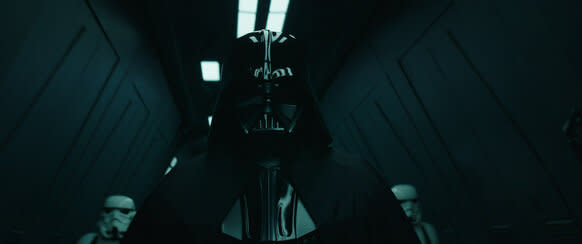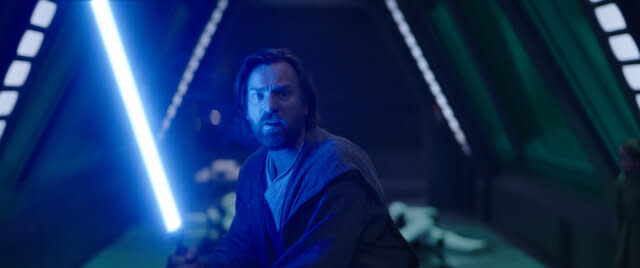'Obi-Wan Kenobi' composer breaks down new themes, explains why we had to wait for 'Imperial March'
- Oops!Something went wrong.Please try again later.
If you were among the millions of fans who tuned in for the Obi-Wan Kenobi limited series on Disney+, then you may have noticed how a number of classic John Williams-composed Star Wars themes don't make themselves apparent until the sixth and final episode. Chief among them is "The Imperial March," the foreboding motif originally concocted for Darth Vader in The Empire Strikes Back that has defined the respirator-breathing antagonist across the last four decades. So why do we not hear the Sith Lord's theme song until the very end, despite the fact that the villain (Hayden Christensen) factors heavily into the show's narrative?
"Everyone was very clear that we don't want Vader until he's Vader," Obi-Wan Kenobi composer Natalie Holt explains to SYFY WIRE over Zoom. "Because he says in Episode 6, ‘You didn't kill Anakin Skywalker...I did.’ You realize he's the Vader that we know, he's the ‘Imperial March’ Vader, and then we hear the 'Imperial March' [following his discussion with Emperor Palpatine]. It's that payoff. I know some of the fans probably wanted to hear it earlier, but that was a deliberate decision from everyone."
To characterize the Vader audiences would follow up to that point, Holt opted for "something angrier and darker and more sinister because you're seeing Vader in the prime of his life. He's the most angry, terrifying form of Vader [we've ever seen]. He’s killing people in the street. So I did have a rhythmic element [derived] from the ‘Imperial March,’ but I was doing something much darker with a hunting horn and more sound design to just make it as unsettling as possible when he was walking down the street."

Obi-Wan Kenobi Season 1 Episode 4 Photo: Lucasfilm
Kenobi is Holt's second major Disney+ undertaking after last summer's Loki TV series, which, in hindsight, offered her more musical leeway than the long-running Star Wars universe. "Loki didn't have any theme attached to him [and] neither did any of the characters around him, so I think I had a bit more room," she admits. "And also, the worldwas a bit more wacky — it's kind of a comedy romp in places. Obi is obviously part of a legacy, part of a history, which comes with the weight of responsibility to find the right balance between the old and the new. I think finding the tone for Obi was a bit more tricky to navigate."
Since it was decided that the "legacy character themes" would be held until the finale, Holt was forced to get creative and not simply take the path of least resistance. When it came to tackling the theme for Obi-Wan/Ben (Ewan McGregor), she acted on advice from director, executive producer, and showrunner Deborah Chow.
"She said, ‘You know, he’s divorced from the Force. He's given it up. He's alone in the desert and he’s not sad about it,'" the composer remembers. "She said, ‘There's not a tragedy in that, he's kind of at peace with being an outsider when we first come to him' ... She just wanted it to feel neutral at the beginning. It was finding that balance of loneliness, but there’s some hope there as well. [Hope] that he's going to have a journey and find redemption and get back to his connection with Qui-Gon."

Obi-Wan Kenobi Season 1 Episode 4 Photo: Lucasfilm
Ben begrudgingly leaves his exile on Tatooine when young Princess Leia (Vivien Lyra Blair) is kidnapped as part of a dastardly plot to draw Obi-Wan out into the open. The return of Leia meant an extended visit to Alderaan (may it rest in pieces), which we haven't seen in live-action since the closing moments in Revenge of the Sith.
Chow initially described Alderaan as "a socialist planet" and "new-tech," Holt recalls. "It’s almost like there's a clean, sort of eco-quality to Alderaan. So it was like, ‘Well, should this be a planet that’s quite modern and synth-y?’ We tried that and it felt too cold. Then we wanted to inject a bit more pace and rhythm to it ... There’s something quite grand about the Alderaan theme, but it's also i modernity with some synths. I think it ended up being a blend of orchestral and modern."
The musical work on Leia "went through many iterations," with one notable directive from the higher-ups: ‘This is not a Disney princess. This is a kind of girl who likes to climb trees she's got some some guts already.’"
"When she rushes out of the forest and we see her for the first time, she climbs up the tree. I just felt like it needed to have a lot of energy and there's that kind of shaker and drums and rhythms," adds the composer. "And then there was quite a sweet little theme that I wrote for her, which I wanted on flutes to kind of tie together with her [legacy] theme as she becomes a fully formed Leia [after] being through this tragedy of losing Tala, forming this connection with Obi-Wan Kenobi, and putting on the holster on at the end. I wanted it to feel like it had grown to that, or it could grow to that."

Princess Leia Organa (Vivien Lyra Blair) in Lucasfilm's OBI-WAN KENOBI, exclusively on Disney+. © 2022 Lucasfilm Ltd. & ™. All Rights Reserved.
In the wake of Order 66 a decade prior, the Empire employs a task force of Inquisitors, Force-sensitive individuals who not only hunt down the last of the Jedi Order, but actively slaughter anyone — man, woman, or child — who shows signs of a high Midichlorian count. Holt wanted to give the Inquisitors (comprised of Sung Kang's Fifth Brother, Rya Kihlstedt's Fourth Sister, and Rupert Friend's Grand Inquisitor) a "rhythmic drive," while sonically separating them from their boss, Vader.
"Vader’s really at the bottom end of everything — like double basses, hunting horns, deep drums," she explains. "The Stormtroopers are kind of snare, militaristic, higher up. And then [for] the Inquisitors, I’d gone more modern and I used synthesizers and a cello slide, but very processed. The Inquisitors theme was the first approved theme I had. I didn't do very many drafts of it and Kathleen [Kennedy] and Deborah really liked the first version of that. So that stuck from quite early on."
Reva/Third Sister (Moses Ingram), on the other hand, was always intended to have her own musical signature, given how the villain's motivations do not strictly align with those of the other Inquisitors. She's brash and unpredictable, owing to a burning desire to kill Vader as revenge for his brutal attack on the Jedi Temple in Episode III.
"I wanted to give her a darkness, but [also convey] the tragedy of what she'd been through in her childhood and the weight [of that]," Holt reveals. "My friend, Úna Palliser, did some humming and I wanted it to feel like a choral for the kind of sadness of what's led her to become Reva. So at the beginning, she's kind of integrated with the Inquisitors, but then this little humming melody comes through and grows throughout. And then in Episode 6, when she hands Luke back over, she has a redemption theme, which is the flip side of her choral."

Obi-Wan Kenobi Season 1 Episode 5 Photo: Lucasfilm
While the Rebel Alliance does not yet exist in this part of the Star Wars timeline, the Empire still faces a great deal of resistance from a Jedi-protective and galaxy-wide network calling itself "The Path." One of its chief operators, Tala (Indira Varma), poses as an Imperial officer on the mining planet of Mapuzo and offers safe haven to those individuals looking to escape retribution from the accursed regime. She aids Ben and Leia on their adventure before giving up her own life in Episode 5.
"I used a nyckelharpa, which I actually used in Loki as well," Holt says of the stringed instrument often used in Nordic culture. "Whenever I hear it, it just feels heartbreaking and I felt like the Force refugees were connected with a kind of on-the-move, haunting folk song. When you see their scrawling on the wall in Episode 3 on Mapuzo, that's where you first hear ‘The Path,’ which is the Force refugee theme, and that's connected with with Tala’s theme. And then Tala’s theme, when she’s killed, turns into this big violin solo, which was played by James Innes. It’s just so emotional and it was so special to have him come and play on the soundtrack as well. He's one of my favorite violinists. I just I loved working with him and I felt like that was a lovely, emotional moment there."
All six episodes of Obi-Wan Kenobi are now streaming on Disney+ and while there have been whispers of a second season (and beyond), Chow feels content to let sleeping womp rats lie. "Deborah categorically said to me that we're leaving it where it should be left," Holt says. "I know that Ewan absolutely adores playing Obi and I think he brings his best game to this. It's such a great performance that he delivers. I sort of feel like the story is ended where it should end and sets up for A New Hope. I guess you could go [with a] teenage Princess Leia, but I don't know..."
The composer goes on to acknowledge the biggest problem posed to established canon, should the two characters ever meet again: Leia's hologram message to Obi-Wan Kenobi in Episode IV, which, of course, makes no mention of their Disney+ adventure. "I just don't believe that they would meet again," Holt concludes. "I know that Ewan loves playing the role, so never say never, but I just feel like it ends in a really powerful place."
The Obi-Wan Kenobi soundtrack is available to purchase and/or stream online.
Looking for more sci-fi goodness? The entire run of SYFY’s Battlestar Galactica is streaming now on Peacock, along with the second season of Resident Alien, which returns to SYFY this fall with new episodes.

